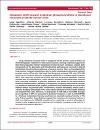Metabolic shift toward oxidative phosphorylation in docetaxel resistant prostate cancer cells

View/
Publisher version (Check access options)
Check access options
Date
2016-08-16Author
Ippolito, LuigiMarini, Alberto
Cavallini, Lorenzo
Morandi, Andrea
Pietrovito, Laura
Pintus, Gianfranco
Giannoni, Elisa
Schrader, Thomas
Puhr, Martin
Chiarugi, Paola
Taddei, Maria Letizia
...show more authors ...show less authors
Metadata
Show full item recordAbstract
Drug resistance of cancer cells is recognized as the primary cause of failure of chemotherapeutic treatment in most human cancers. Growing evidences support the idea that deregulated cellular metabolism is linked to such resistance. Indeed, both components of the glycolytic and mitochondrial pathways are involved in altered metabolism linked to chemoresistance of several cancers. Here we investigated the drug-induced metabolic adaptations able to confer advantages to docetaxel resistant prostate cancer (PCa) cells. We found that docetaxel-resistant PC3 cells (PC3-DR) acquire a pro-invasive behavior undergoing epithelial-to-mesenchymal-transition (EMT) and a decrease of both intracellular ROS and cell growth. Metabolic analyses revealed that PC3-DR cells have a more efficient respiratory phenotype than sensitive cells, involving utilization of glucose, glutamine and lactate by the mitochondrial oxidative phosphorylation (OXPHOS). Consequently, targeting mitochondrial complex I by metformin administration, impairs proliferation and invasiveness of PC3-DR cells without effects on parental cells. Furthermore, stromal fibroblasts, which cause a "reverse Warburg" phenotype in PCa cells, reduce docetaxel toxicity in both sensitive and resistant PCa cells. However, re-expression of miR-205, a microRNA strongly down-regulated in EMT and associated to docetaxel resistance, is able to shift OXPHOS to a Warburg metabolism, thereby resulting in an elevated docetaxel toxicity in PCa cells. Taken together, these findings suggest that resistance to docetaxel induces a shift from Warburg to OXPHOS, mandatory for conferring a survival advantage to resistant cells, suggesting that impairing such metabolic reprogramming could be a successful therapeutic approach.
Collections
- Biomedical Sciences [819 items ]


